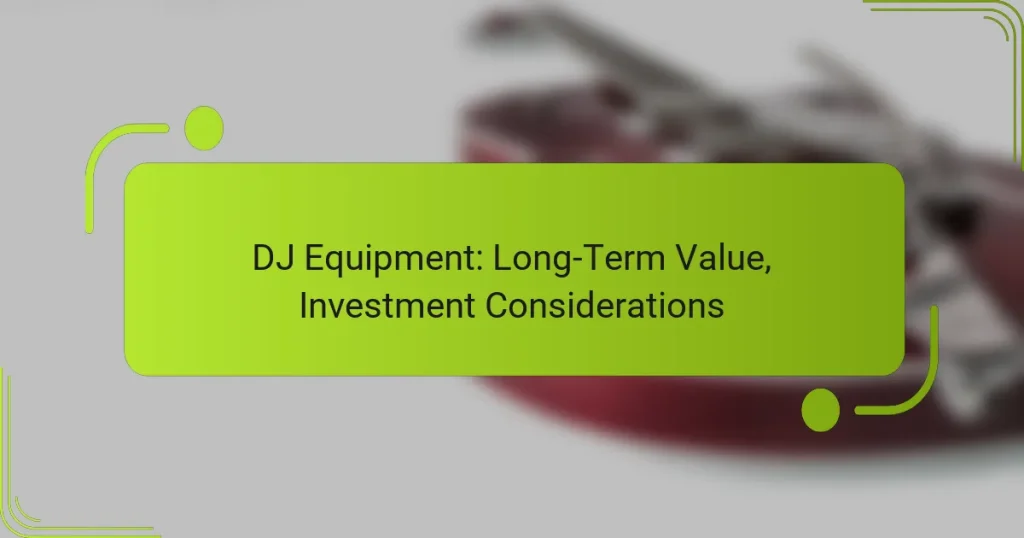Investing in high-quality DJ equipment is crucial for achieving long-term value and enhancing performance. By focusing on factors such as build quality, brand reputation, and user reviews, DJs can ensure their gear withstands regular use while adapting to technological advancements. Essential items like mixers, turntables, and controllers play a significant role in maintaining a professional edge in the competitive music scene.

What are the best DJ equipment investments for long-term value?
Investing in high-quality DJ equipment can yield significant long-term value, enhancing both performance and durability. Key items such as mixers, turntables, speakers, headphones, and controllers are essential for any serious DJ looking to maintain a professional edge.
High-quality mixers
High-quality mixers are crucial for seamless transitions and sound manipulation during performances. Look for models that offer a range of inputs and outputs, as well as built-in effects. Brands like Pioneer and Allen & Heath are known for their reliability and sound quality, often retaining value over time.
Consider investing in mixers with digital interfaces, as they can provide more flexibility and connectivity options. A good mixer can range from a few hundred to several thousand dollars, depending on features and brand reputation.
Professional turntables
Professional turntables are essential for DJs who prefer vinyl or need a reliable source for scratching. Direct drive models are generally favored for their quick start-up times and durability. Popular choices include Technics and Numark, which are known for their longevity and performance.
When selecting turntables, consider features like pitch control and adjustable torque. A solid pair can cost anywhere from $300 to over $1,000, but investing in quality will ensure they last for years and maintain resale value.
Durable speakers
Durable speakers are vital for delivering clear sound in various environments. Look for speakers with robust construction and good power handling capabilities. Brands like JBL and QSC are often recommended for their sound quality and durability.
When purchasing, consider the size and wattage based on your typical venues. A good pair of speakers can range from $500 to $2,000, depending on specifications and brand. Investing in reliable speakers can significantly enhance your performance and audience experience.
Reliable headphones
Reliable headphones are essential for monitoring sound and ensuring mixes are accurate. Look for closed-back designs that provide good isolation and comfort during long sessions. Brands like Sennheiser and Audio-Technica offer models that are popular among professionals.
Consider features such as detachable cables and foldable designs for portability. A quality pair of DJ headphones typically costs between $100 and $300, making them a worthwhile investment for any serious DJ.
Versatile controllers
Versatile controllers allow DJs to manipulate software and hardware seamlessly, making them a crucial investment. Look for controllers that offer a range of features, including pads, faders, and knobs that can be mapped to various functions. Brands like Native Instruments and Numark are well-regarded in this space.
When choosing a controller, consider compatibility with your preferred DJ software. Prices can range from $200 to $1,500, depending on the complexity and features. A good controller can greatly enhance your creative capabilities and adaptability in different settings.

How to evaluate DJ equipment for longevity?
To evaluate DJ equipment for longevity, focus on its build quality, brand reputation, warranty options, and user reviews. These factors will help you determine whether the equipment will withstand regular use and maintain its performance over time.
Assess build quality
Build quality is crucial for the longevity of DJ equipment. Look for materials like metal and high-grade plastics that can endure wear and tear. Equipment with reinforced components often lasts longer than those made with cheaper materials.
Check for features such as sturdy knobs, durable faders, and solid casing. These elements contribute to the overall resilience of the gear, making it more reliable during gigs.
Check brand reputation
Brand reputation plays a significant role in the durability of DJ equipment. Established brands often have a track record of producing reliable gear that stands the test of time. Research brands known for their quality and customer service.
Consider brands that are popular among professional DJs, as they typically invest in better materials and technology. Look for reviews and testimonials from other users to gauge their experiences with specific brands.
Review warranty options
Warranty options can indicate the manufacturer’s confidence in their product’s longevity. A longer warranty period often suggests that the equipment is built to last. Look for warranties that cover parts and labor, as these provide better protection.
Some manufacturers offer extended warranties for an additional cost, which can be worthwhile if you plan to use the equipment frequently. Always read the fine print to understand what is covered and for how long.
Consider user reviews
User reviews provide valuable insights into the real-world performance of DJ equipment. Look for feedback on durability, ease of use, and any common issues that arise after extended use. Reviews can help you identify potential problems before making a purchase.
Pay attention to reviews from professional DJs, as they often provide detailed assessments based on extensive use. Platforms like forums and social media can also be good sources for candid opinions and experiences.

What are the key features of long-lasting DJ gear?
Long-lasting DJ gear is characterized by durability, versatility, and the ability to adapt to evolving technology. Key features include robust materials, modular design, upgrade potential, and compatibility with various software platforms.
Robust materials
Durability in DJ equipment often hinges on the materials used in its construction. High-quality metals, reinforced plastics, and weather-resistant finishes can significantly extend the lifespan of gear. Look for products that specify their material composition to ensure they can withstand the rigors of frequent use.
For instance, a DJ mixer made with aluminum chassis is typically more resilient than one made from cheaper plastic. Investing in gear with robust materials can save you money in the long run by reducing the need for repairs or replacements.
Modular design
A modular design allows for easy repairs and upgrades, making it a valuable feature for long-lasting DJ gear. Equipment that can be disassembled and serviced means that individual components can be replaced without needing to buy a whole new unit. This can be particularly beneficial for high-use items like controllers and mixers.
When considering modular gear, check if parts are readily available and whether the manufacturer offers support for repairs. This can enhance the longevity of your investment and keep your setup current with minimal expense.
Upgrade potential
DJ equipment that offers upgrade potential can adapt to new technologies and changing music trends. Look for gear that allows for firmware updates or has slots for additional features, such as effects or sound cards. This flexibility can extend the life of your equipment significantly.
For example, a digital audio interface with the ability to add new plugins can keep your setup relevant as software evolves. Prioritize brands known for regular updates and support to maximize your investment.
Compatibility with software
Compatibility with various DJ software platforms is crucial for ensuring that your gear remains functional as technology advances. Equipment that works seamlessly with popular software like Serato, Traktor, or Rekordbox can enhance your performance and workflow.
Before purchasing, verify that the gear supports the software you plan to use. This can prevent future compatibility issues and ensure that you can take advantage of the latest features and updates in the DJ software ecosystem.

How does brand impact DJ equipment investment?
The brand of DJ equipment significantly influences its long-term value and investment potential. Established brands often provide reliability and resale value, while emerging brands may offer innovative features that appeal to specific needs.
Established brands like Pioneer
Established brands, such as Pioneer, are known for their quality and durability, making them a safe investment for DJs. Equipment from these brands typically retains its value well, often selling for a higher percentage of the original price in the resale market.
For instance, a used Pioneer DJ mixer can often fetch between 60-80% of its retail price, depending on its condition. This reliability makes established brands a preferred choice for both amateur and professional DJs looking to build a long-lasting setup.
Emerging brands with innovation
Emerging brands often focus on innovation and unique features that can attract new users. While these brands may not have the same resale value as established names, they can offer cutting-edge technology at competitive prices.
For example, a new brand might introduce a controller with advanced software integration or unique sound effects, appealing to DJs looking for something fresh. However, potential buyers should research the brand’s reputation and customer support before investing.
Resale value considerations
When considering the resale value of DJ equipment, brand reputation, condition, and market demand are key factors. Established brands generally have a more predictable resale value, while emerging brands may fluctuate based on trends and user reviews.
To maximize resale value, keep equipment in excellent condition and retain original packaging. Additionally, staying informed about market trends can help you time your sale for the best return on investment.

What is the cost-benefit analysis of DJ equipment?
The cost-benefit analysis of DJ equipment involves evaluating the initial purchase price against potential long-term savings and income generation. Understanding these factors helps DJs make informed decisions about their investments, ensuring they choose equipment that offers both quality and value over time.
Initial investment vs. long-term savings
When considering DJ equipment, the initial investment can vary significantly based on the brand and features. High-quality gear may require a larger upfront cost, but it often results in better durability and performance, leading to long-term savings on replacements and repairs.
For instance, investing in a professional-grade mixer or turntables may cost several hundred to thousands of dollars initially, but these items can last for years, reducing the need for frequent upgrades. A good rule of thumb is to consider equipment that offers a warranty or service plan, which can further enhance long-term savings.
Maintenance costs
Maintenance costs are a critical aspect of the cost-benefit analysis for DJ equipment. Regular upkeep, such as cleaning, software updates, and occasional repairs, can add to the overall expense. Budgeting for these costs is essential to avoid unexpected financial burdens.
Typically, maintenance can range from minor expenses, like cleaning supplies, to larger costs for professional servicing. It’s advisable to set aside a percentage of your equipment’s value annually for maintenance, ensuring that your gear remains in optimal condition without straining your finances.
Potential rental income
Renting out DJ equipment can provide a significant source of additional income, making it an attractive investment strategy. Many DJs earn money by renting their gear for events, which can offset the initial costs and contribute to long-term profitability.
For example, if you own a set of high-demand speakers or lighting systems, you could charge anywhere from a few hundred to over a thousand dollars per event, depending on the market and demand. Establishing a rental agreement with clear terms can help maximize this income stream while ensuring your equipment is well cared for during rentals.


